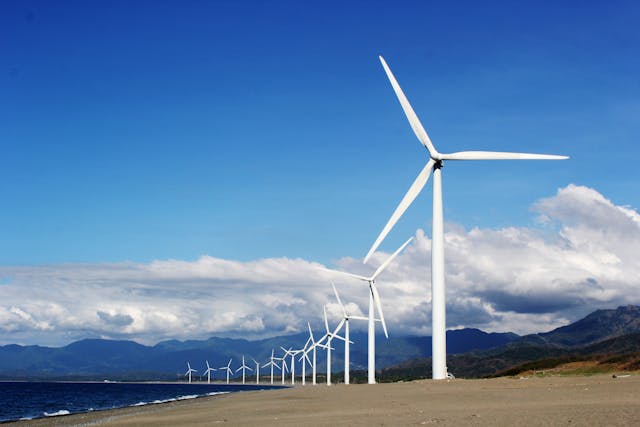Koofr Cloud Storage: a Green and Sustainable Choice for Your Data
The demand for data storage is growing. And as our reliance on digital storage increases, so does the need for sustainable solutions that can keep up with this growth while minimizing environmental impact. Enter cloud storage - a modern, efficient, and eco-friendly alternative to traditional data storage methods.
Written by human for humans
Imagine this: your smartphone is buzzing with alerts, warning you that its storage is almost full. Your laptop's hard drive is packed with documents, photos, and videos, and your external drives are scattered around, each filled to capacity. Sound familiar? We are all drowning in data. In our digital age, the need for data storage has skyrocketed, leaving many of us grappling with overflowing devices and the constant search for more space.
But this isn’t just a personal dilemma; it’s a global one. As our collective digital footprint expands, so does the demand for data storage solutions. Cloud services and data centers are being utilized more than ever to keep up with this surge. However, the environmental impact of data storage is substantial. As we continue to generate and store more data, it’s crucial to consider the sustainability of our data storage practices. Addressing the environmental impact of data storage solutions is essential for a more sustainable digital future.

The environmental effects of data centers
Data centers are generally energy-intensive facilities, requiring substantial power to operate. Their emissions can be categorized into three main areas: energy consumption used to run the servers, water usage used to cool the servers, and the lifetime of hardware which impacts the frequency of the needed replacements. Their production, transportation, and the disposal of used servers contribute to the environmental footprint of data storage.
We talked about electronic waste that comes with traditional data storage devices in The development of data storage: from memory cards to the cloud
However, recent research indicates that hyperscale data centers are much more efficient and environmentally friendly compared to traditional on-premises data centers. According to Climatiq, hyperscalers can be up to five times less carbon-intensive than their on-premises counterparts.
Cloud Storage: Reducing environmental impact
Cloud storage providers such as Koofr have the potential to significantly mitigate the environmental impact of data storage through various strategies.
Here’s how they leverage economies of scale, renewable energy sources, and server consolidation to promote sustainability:
One of the key advantages of cloud storage providers is their ability to leverage economies of scale. By consolidating the data storage needs of multiple users into shared data centers, they can operate more efficiently than individual users or smaller companies could on their own.
Large-scale data centers use advanced cooling systems, which are designed to manage the heat generated by numerous servers more effectively than smaller, dispersed units. This centralized approach not only reduces energy consumption per unit of data stored but also lowers overall costs, making sustainable practices more economically viable.
Investing in renewable energy is another significant way cloud storage providers can reduce their carbon footprint. By using data centers powered by solar, wind, or hydroelectric energy, they are able to drastically cut down on the greenhouse gas emissions associated with traditional fossil fuels. This commitment to green energy not only helps the environment but also aligns with the growing consumer demand for eco-friendly services.

As consumers and businesses continue to seek out sustainable options, the role of cloud storage providers in promoting green practices becomes increasingly important. Through economies of scale, investments in renewable energy, and server consolidation, companies like Koofr are leading the way towards a more sustainable future for data storage.
Sustainability Case Study: Koofr Cloud Storage
Koofrs' commitment to sustainability is present in everything we do. From our website, which has a A+ carbon rating and highlights our effort to minimize our carbon footprint and operate in an environmentally responsible manner, to our severs.
Our servers are located in data centers in Germany, EU, at a company renowned for its sustainable practices. Practices, that are after our own heart. Their data centers are powered completely by renewable energy sources, including wind and hydroelectric power.
Why European companies should use European cloud storage services
The energy efficiency of a data center is often measured by its Power Usage Effectiveness (PUE). A power usage effectiveness (PUE) value of 1.0 indicates that all energy consumed by a data center is used to power actual IT infrastructure. The best data centers in the world achieve a PUE of 1.2 and we are proud to say that the data centers of our partner achieve a PUE very close to this number. They only use air to cool down the servers, so they do not add to water consumption. This approach not only conserves water but also reduces the ecological impact of the data center operations.

As far as the hardware part of the emissions equation goes, manufacturing servers involves energy-intensive processes and the use of raw materials. The disposal of servers, IT recycling and thus the contribution to e-waste is for now, an open question. While IT equipment can be recycled, we currently have no data on the use of these processes.
Working with our data center partner is part of Koofr's way to contribute to a more sustainable digital ecosystem. Their commitment to using renewable energy aligns with our sustainability goal of minimizing our carbon footprint. We provide reliable and secure cloud storage while being committed to reducing consumption and emissions.
How Customers Can Contribute to Sustainable Data Storage
What can the customers do, you might ask? While services like Koofr implement numerous sustainable practices, customers can also contribute to reducing their carbon footprint by adopting some simple measures.
Customers can reduce their environmental impact by storing only the data they truly need. Removing unnecessary files not only decreases the space occupied on servers but also reduces the need for additional physical storage devices, thereby lowering energy consumption and emissions.
Hyperscale data centers are up to five times less carbon-intensive than on-premises data centers. Using services like Koofr, which hosts its data on hyperscale servers in Germany, allows users to take advantage of highly efficient infrastructure that utilizes renewable energy sources and advanced cooling technologies.
Duplicate files increase storage space usage and, consequently, the energy demands of data centers. Koofr offers a duplicate file finder that allows users to easily locate and delete their duplicate files. This not only optimizes storage space usage but also reduces the need for additional servers.
Using dark mode on your screens can help save energy. Research shows that dark mode can reduce electricity consumption by up to 40%. By switching to dark mode, users can contribute to energy savings, especially on devices with OLED screens, where dark mode has the most significant impact on battery and electricity consumption.
By adopting these simple measures, customers can significantly reduce their carbon footprint and contribute to more sustainable data storage usage. By using renewable energy sources, Koofr allows users to store data in an environmentally friendly way.

While there are areas open to improvements, like hardware recycling, Koofr is working to leverage renewable energy to offer the most eco-friendly version of its cloud storage solution by using servers in Germany powered by a 100% renewable energy sources. We benefit from our data center partner's advanced cooling technologies that rely solely on air, eliminating water usage and enhancing energy efficiency.
By embracing green practices, Koofr ensures that its operations are environmentally responsible. By collectively making conscious choices about our data storage, we can reduce the impact on our environment. Each small action, from storing only necessary data to using energy-efficient settings, contributes to a healthier planet. Together, we can drive the tech industry toward a more sustainable practices, ensuring that our digital advancements respects rather than harm our environment. Come to the green side. We don't have cookies.
Join us on the Koofr subreddit. We'd love to hear from you!


